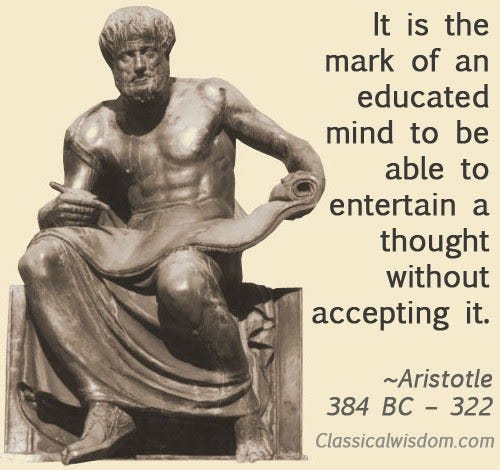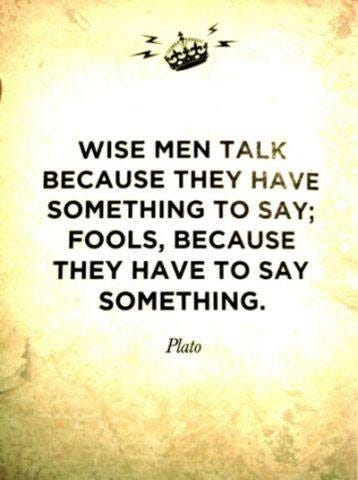Dear Classical Wisdom Reader,
For those of you who are just joining us, each week we delve into the lessons from the past… whether it concern philosophy, history or the great stories and myths that have survived for thousands of years.
We find the filter of time helpful, and the perspective it brings even more so. Sort of like a forest - trees type of thing, if you know what I mean.
Of course the ancient world, from which we source our weekly inspiration, is wide, vast and diverse… both with regards to the time and space it covers as well as the people, themes and topics included.
Today, for example, we’ll learn how to argue like a philosopher - after all, we aren’t going through life without the occasional debate - so you might as well do it right!
Next week, however, it could be about Julius Caesar (in fact, it most definitely will since the Ides of March is coming!), the story of the first female physician Agnodice, or the evil machines of Archimedes (see below).
We also discuss the most magnificent legends and think about them in new ways.
Classical Wisdom Members, for instance, enjoyed an in-depth article on Helen of Sparta… renowned for her beauty and for launching a thousand ships that brought down Troy… many are unaware of the immense power and importance she held.
You can start to read the True Story of Helen of Sparta HERE.
Now, onto today’s excellent article. Van Bryan lays out 4 very simple rules on how to properly argue like a philosopher. If you don’t have much time, make sure to check out rule number 4. (Van says if you read nothing else, read it…)
PLUS: There’s a challenge at the end for those of you keen to illustrate your new found philosophical skills… if you dare ;-)
All the best,
Anya Leonard
Founder and Director
Classical Wisdom and Classical Wisdom Kids
How To Argue Like A Philosopher
By Van Bryan, Contributing Writer, Classical Wisdom
Despite popular opinion, screaming at one another is not arguing. Well, at least it’s not what arguing should be.
All of the talking heads and political pundits you see on the television may claim to be “engaging in a civilized discourse,” but they’re not. Arguing is not meant to be a shouting match where the louder the aggressor is, the more likely he or she will achieve victory.
You might think that the time you and your roommate started screaming at each other because the dishes had gone unwashed for several weeks was an “argument.” In truth, it was not. That may seem rather strange, but if you ever want clarification on the matter, all you really have to do is talk to a philosopher.
Arguing, after all, is what philosophy is all about.
But let’s not miss the point. Philosophers do not just argue. They argue in the right way, for the right reasons, with plausible premises that must necessarily support some sort of conclusion. When you get right down to it, that’s really what philosophy is; a process of a priori argumentation that seeks to come to some new conclusion.
So today we are going to go over just a few rules that logical argumentation should follow. We are going to put some philosophy to work. Whether you want to be a full fledged lover of wisdom, or simply want to maintain your status as a free-thinking, independent person, you really ought to know how to argue like a philosopher.
Rule 1: Statements have truth value
The first thing we ought to know, seeing as we are on our way to arguing like philosophers, is that arguments are different from statements.
What is a statement? Very simply, a statement is any sentence that has a truth value. A statement is either true or false.
An example: The taxi cab outside my window is yellow. If the taxi cab outside the window is, in fact, yellow, then the statement is true. However, the taxi could just as easily have been green, blue or pink with white polka dots. This may seem rather straight forward; and in a fair world, it would be.
The problem is that, while statements most assuredly are true or false, we often have a hard time knowing which is the case. The following sentences are certainly statements, however we may not know whether they are true or false:
Achilles was the bravest warrior in all of Greece.
Socrates was the wisest man in all of Athens.
The Sophists are a bunch of greedy, no-good scoundrels.
While we might be simply tempted to label these statements as either true or false, we certainly need more support before we can say with any certainty.
This brings us to…
Rule 2: Arguments are constructed from statements
A syllogism is an argument constructed from two or more previously known statements which lead us naturally, and necessarily, to a third previously unknown statement.
Aristotle is often given credit for discovering the syllogism and creating formalized logic in the process. This was nothing short of revolutionary, especially considering that the syllogism is still the basis of our formalized logic almost 2500 years later.
In a syllogism, there are two previously known statements which are known as premises. Ideally, the premises should logically follow and support a third, previously unknown statement, the conclusion.
For example:
Premise 1: All men are mortal.
Premise 2: Socrates is a man.
Conclusion: Socrates is mortal.
Put very simply…
An argument is a series of statements, some of which (known as premises) are offered in support of a third statement (the conclusion).
A statement is a sentence that has truth value; it is either true or false.
You might be tempted to call it quits right here. After all, you now know about statements, arguments, and the all-important syllogism. You are on your way to becoming a functioning philosopher as well as a more informed citizen of the world.
But there are still a few more rules we have to get to. They are, in my opinion, essential to any person who doesn’t want to be swayed by other, nefarious individuals. Our next rule is…
Rule 3: Premises must be plausible
It is rather obvious that some arguments are better than others. But what makes one argument better than the other? The first thing we need to identify is the plausibility or implausibility of the premises.
We may not always know whether premises are true or false. Therefore, we are forced to consider instead if the premises are plausible. In a philosophical context, plausibility just means that the statement is not only possible, but that it is also likely or probable. If we wanted to continue to use Socrates as an example, we might say:
Premise1: Socrates accepts his own ignorance and believes he knows very little. (true)
Premise 2: True wisdom is accepting limitations and pursuing knowledge. (plausibly true)
Conclusion: Socrates is the wisest man in Athens.
Having plausible premises is essential for crafting a good argument. Creating an argument with premises that are either false or implausible is tantamount to lying. Lying does not guarantee truth. And truth, after all, is what we are looking for.
Plausibility is not always easy to detect. When rolling a six sided die, it seems plausible that I will not roll a six. After all, it is much more likely that I will not roll a six than I will roll a six.
However, when considering arguments of a philosophical nature, such as metaphysical reality or the existence of a human soul, we often enter the murky realms of uncertainty. And while we very rarely can say for certain whether a premise is true or false, we must always consider whether it is plausible or implausible.
After all, premises are simply reasons that we present in order to convince you of our conclusion. Without solid premises, our conclusion need not be accepted.
This leads us to our final rule for today. If you read nothing else, read this…
Rule 4: Always identify bad arguments
Whether by intention or by ignorance, people will inevitably present you with a series of bad arguments. It is your job, as a philosopher and independent thinker, to spot these bad arguments and boldly declare,“Wait just one minute there, Jack.”
We have talked about identifying bad arguments by spotting premises that are implausible. The other thing we must look for are premises that do not logically follow. That is to say, something in the argument just does not seem right.
For instance, you might be faced with an argument where two false or implausible premises actually lead to a true conclusion.
For example:
Premise 1: Socrates was a bird (false)
Premise 2: All birds are philosophers (false)
Conclusion: Socrates was a philosopher (true!)
Additionally, you might have the opposite problem where two premises are true, yet they lead to a false conclusion.
For example:
Premise 1: Socrates was Greek (true)
Premise 2: Plato was Greek (true)
Conclusion: Socrates was Plato (false!)
This type of argument is very dangerous. An unskilled individual might recognize that the premises are true and therefore conclude that the third premise must be true out of necessity. We must not think in such ways. It is our duty to always spot bad arguments.
In Conclusion...
Whether you want to be a truly great philosopher or simply don’t want to be taken advantage of, understanding good arguments and the role they play in uncovering truth is an essential skill. It is a skill that, unfortunately, is being traded in these days for fiery rhetoric and bold, shocking statements.
You, dear reader, are proof that the desire for wisdom, for deeper truth is alive and well. When considering arguments, always ask yourself the following questions.
Are there premises that support a conclusion?
Are the premises true, or at least plausible?
Do the premises support the conclusion, or are they disjointed?
Does the argument, as a whole, logically follow?
If you find yourself answering “no” to any of these questions, then you ought to take a second look at the conclusion you were presented with.
You see bad arguments everywhere, in magazines, on the television, from your annoying coworkers. And with this in mind, I have a very small homework assignment for you.
Find an example of bad argumentation in popular media. Whether you are flipping through the nightly news or pouring over the New York Times, look for arguments that break these rules and write in with the example. Tell us why the argument is no good and mention how it could be improved.
Don’t think of this as a chore, think of it as a challenge. I have the utmost faith in you, dear reader. You are the modern philosophers that prove that the wisdom of antiquity is alive and well. I will be eagerly awaiting your responses.
Good luck.









An argument does not exclusively refer to a disagreement, a debate or even a tortured process to determine who is correct (or, worse yet right; the hot, throbbing rhetorical id of the internet). An argument is the expression of thought and reasoning on behalf of a point of view that seeks to describe and/or explain. This distinction is important to me today because, philosophers share ideas. The business of Philosophy is to love wisdom for which dispute is not necessary. Winning 'arguments' is what sophistry teaches.
I was a philosophy student from 1969-1972, and this was a welcome reminder of my enjoyment of the subject.